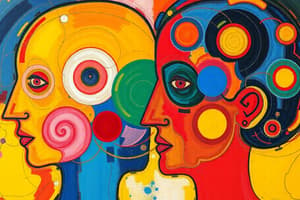Podcast
Questions and Answers
What is a key focus of functionalism in psychology?
What is a key focus of functionalism in psychology?
- Examining the functions of mental processes (correct)
- Studying the relationship between mind and body
- Analyzing individual behaviors in isolation
- Understanding the structure of the mind
How does philosophical materialism differ from idealism in psychological terms?
How does philosophical materialism differ from idealism in psychological terms?
- It considers the mind to be a result of physical processes (correct)
- It advocates for the separation of mind and body
- It focuses solely on abstract concepts without physical implications
- It emphasizes the existence of non-physical entities
Which of the following is an emphasis of structuralism in psychology?
Which of the following is an emphasis of structuralism in psychology?
- The breakdown of mental processes into basic components (correct)
- The study of psychological disorders
- The environmental influence on actions
- The observable behavior of subjects
What does the distinction between monism and dualism primarily address?
What does the distinction between monism and dualism primarily address?
Which philosophical approach emphasizes that external, physical, and social surroundings influence behavior?
Which philosophical approach emphasizes that external, physical, and social surroundings influence behavior?
What is the primary function of an agonist drug in relation to receptor activity?
What is the primary function of an agonist drug in relation to receptor activity?
Which neurotransmitter function occurs after synthesis and storage in vesicles?
Which neurotransmitter function occurs after synthesis and storage in vesicles?
In the context of postsynaptic potential, what does an excitatory postsynaptic potential (EPSP) typically result in?
In the context of postsynaptic potential, what does an excitatory postsynaptic potential (EPSP) typically result in?
What characterizes spatial summation in postsynaptic integration?
What characterizes spatial summation in postsynaptic integration?
What is the primary role of the autonomic nervous system?
What is the primary role of the autonomic nervous system?
Which of the following describes the difference between a nerve and a neuron?
Which of the following describes the difference between a nerve and a neuron?
What is the effect of an antagonist drug on receptor activity?
What is the effect of an antagonist drug on receptor activity?
What does the term 'afferent' refer to in the context of the nervous system?
What does the term 'afferent' refer to in the context of the nervous system?
During which process do receptors open potassium channels to hyperpolarize the neuron?
During which process do receptors open potassium channels to hyperpolarize the neuron?
What is the main focus of Functionalism in psychology?
What is the main focus of Functionalism in psychology?
How does Philosophical Materialism explain the relationship between mental events and physical events?
How does Philosophical Materialism explain the relationship between mental events and physical events?
Which philosopher is associated with the concept of Monism?
Which philosopher is associated with the concept of Monism?
What aspect differentiates Realism from Idealism in philosophy?
What aspect differentiates Realism from Idealism in philosophy?
What was the primary method used in Structuralism to understand the mind?
What was the primary method used in Structuralism to understand the mind?
Which statement best describes the view of Dualism regarding mind and body?
Which statement best describes the view of Dualism regarding mind and body?
Which of the following best describes the stance of Philosophical Empiricism?
Which of the following best describes the stance of Philosophical Empiricism?
Edward Titchener was primarily known for his contributions to which psychological perspective?
Edward Titchener was primarily known for his contributions to which psychological perspective?
According to the principles of Idealism, our perception of the world is influenced by what factor?
According to the principles of Idealism, our perception of the world is influenced by what factor?
Which of the following best encapsulates the main idea of Monism?
Which of the following best encapsulates the main idea of Monism?
Study Notes
Monism vs Dualism
- René Descartes introduced dualism, considering mind as non-physical and body as physical.
- Philosophical Dualism distinguishes mind and body as separate entities.
- Materialistic Dualism asserts the mind is different but specifically physical.
- Thomas Hobbes proposed monism, viewing the mind as a product of brain's physical actions.
- Philosophical Monism argues mind and body are one and the same.
- Philosophical Materialism states mental events derive from physical events.
Realism vs Idealism
- John Locke emphasized the need to understand human mind capabilities and limits.
- Philosophical Realism posits that perception is created through sensory input.
- Immanuel Kant believed in innate knowledge, with experiences enhancing understanding.
- Philosophical Idealism suggests perception is shaped by brain's interpretation of sensory data.
Empiricism vs Nativism
- Philosophical Empiricism claims knowledge arises solely from experience, e.g., learning through personal encounters.
- Philosophical Nativism argues knowledge is innate, present from birth, such as instinctual reactions.
Structuralism and Functionalism
Structuralism
- Wilhelm Wundt, known as the "Father of Modern Psychology," advocated for scientific methods to study the mind.
- Focused on breaking down mental processes into basic elements.
- Edward Titchener, Wundt's student, promoted introspection to examine subjective experiences.
Functionalism
- William James investigated the functions and purposes of consciousness, inspired by Darwin's theories.
- Functionalism emphasizes the adaptive significance of mental processes for survival and reproduction.
Modern Perspectives
Psychodynamic Perspective
- Jean-Martin Charcot and Pierre Janet treated hysteria with unknown physical causes.
- Sigmund Freud developed psychoanalysis, focusing on unconscious influences on behavior.
- Psychoanalysis aims to provide insights into unconscious mind dynamics.
Behaviourism
- Ivan Pavlov's classical conditioning showed how stimuli can evoke physical responses through learning.
Neurotransmitter Actions
- Neurotransmitter processes include synthesis, storage, release, binding, and deactivation.
Drugs and Receptors
- Agonists increase receptor activity; antagonists decrease it.
- Direct drugs bind to the same site; indirect drugs bind to different sites.
Postsynaptic Potential
- Postsynaptic potential (PSP) alters the likelihood of neuron firing; it can be excitatory (EPSP) or inhibitory (IPSP).
- EPSP involves depolarization; IPSP results in hyperpolarization.
Integration of Signals
- Spatial Summation merges simultaneous signals at various dendritic locations.
- Temporal Summation combines signals that arrive close in time.
Nervous System Essentials
Directional Terms
- Dorsal: toward the back, Ventral: toward the stomach, Anterior: front, Posterior: rear.
- Superior: above, Inferior: below, Lateral: side, Medial: middle.
Important Terminology
- Neuron: single nerve cell; Nerve: bundle of axons in the peripheral nervous system; Tract: bundle of axons in the central nervous system.
Nervous System Organization
- Peripheral Nervous System: outside CNS; comprises Somatic (voluntary) and Autonomic (involuntary) systems.
- Autonomic system includes Sympathetic (fight or flight) and Parasympathetic (rest).
Early Brain Studies
- Microscopy advancements enabled individual neuron study, complemented by staining techniques for visualization.
Psychology History
- Psychology's terminology reflects biases shaped by historical gender, racial, and social factors.
- Etymology: derived from Greek "psyche" (soul) and "logos" (study).
Defining Psychology
- Psychology studies mind and behavior, encompassing both internal (covert) and external (overt) actions.
- Goals include measuring, explaining, predicting, and modifying behavior through various perspectives (psychological, biological, environmental).
Philosophical Roots
- Greek philosophers questioned morality and human nature, while early physiologists explored brain anatomy's impact on behavior.
The Mind-Body Problem
- Central inquiry: How to study the mind, an unobservable entity, and the relationship between mind and behavior.
Studying That Suits You
Use AI to generate personalized quizzes and flashcards to suit your learning preferences.
Related Documents
Description
Explore the foundational concepts of monism and dualism in philosophy through this quiz. Examine key thinkers like Descartes and Hobbes, and delve into their contrasting views on the relationship between mind and body. This quiz also touches on realism, idealism, empiricism, and nativism.




